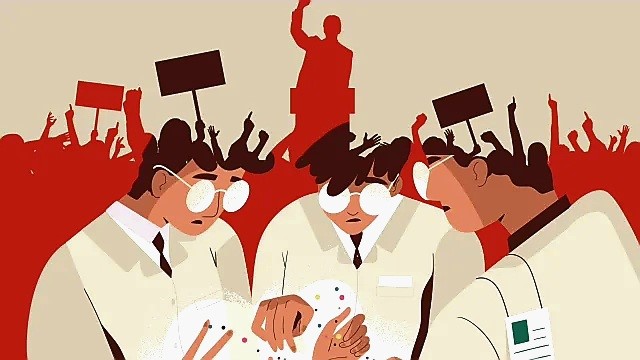Politicians think that they know better than scientists and will always look for opportunities to use science to legitimise their actions

I was trained in science, won a gold medal in my area of specialisation and hold tertiary qualification from a 167-year-old prestigious Indian university, whose distinguished alumni list includes names of Homi Bhabha, Homi Sethna, K. Kasturirangan, Madhav Gadgil, Raja Ramanna, Raghunath Mashelkar and Salim Ali (to name a few, since academic legacy still matters). Importantly, I have spent a good 44 years learning, teaching and practicing science, and it is my firm conviction that I know very little from what there is to be known!
Regrettably, we now live in an age where our competency and capability get validated by our proximity to those wielding executive power. Our affiliations determine our rational fitness, self-adorned titles impress people, and our ability to ‘auto install’ that stunning halo around our heads showcasing our invincibility and indispensability catapult us into prominence. Those who do not get into this ‘spoils system’ are cursed to darkness and an incognito status, or at best accommodated into a subservient slot, where one is expected only to fulfil quorum and concurrence, obediently chanting ‘aye aye sir’.
Keeping a low profile without a tactical image management invites redundancy and one soon becomes overlooked, ostracised and obsolete; despite a sincere, consistent, and non-remunerative practice of science. ‘Science for sake of science’ driven by that innate urge for understanding the unknown is old fashioned now. Today, the scientist is expected to be politically accountable, and in sync with the design and desire of the determinedly manipulative forces that control funds and decision making. And these ‘fast-track scientists’ get their recognition and rewards very fast. Exasperating that it is, there exists a breed of ‘state-petted scientists’ with state-attributed polymathy that wins for them an omnipresence in all key decision-making bodies pertaining to the skies, waters and land! Great indeed, if such multipotentiality is real rather than assumed, the state coffers will hold its last penny longer, by not hiring exorbitantly expensive expertise from outside. Such arrogant and fabled ‘I know it all’ stance is detrimental to the very spirit of science, the freedom of enquiry and upholding truth.
One must admit though, that the new crop of scientists is practical, bold and politically ductile and malleable, knowing exactly which piece to pick to complete the ‘jigsaw puzzle’. The methodical ‘go by the rigor and rigmarole’, believing in protocols, consultation, and validation is the old-world charm and out of fashion. The data that is tactfully thrown into public domain now needs to win confidence of the agency that has commissioned the study with an intention to tilt decisions in its favour. Science is a collective institution mandated to refine our understanding of the natural world around us, of which we are a part, and in which we partake. Science has epistemic authority, and policy decisions must be based on scientific conclusions.
Scientists are usually reticent when it comes to politics, but invariably are targets of politics and politicians. The flashpoint is when science is sought to be bent for political reasons. While it is acceptable that ideological framework or electoral compulsions can override scientific evidence, discrediting science to support a policy decision is simply unacceptable.
Often the ‘commissioned scientists’ churn out ‘policy-based evidence’ to hold their fort, conveniently forgetting that they should advocate ‘evidence-based policy’. ‘Bending of science’ is practiced by a section of political class that shows scant respect for any views that are contradictory to their own. To douse any opposition these ‘science antagonists’ cherry-pick experts and reports that support their viewpoint, while harassing and humiliating scientists they dislike for their candour and bluntness, even coercing them to change the language of their report. Some politicians aggrandize self by trivialising the scientific community that question their prudence (or rather lack of it). There is a clear threat perception that frank scientific data can highlight negative trends such as rising pollution, declining forest cover, increasing unemployment and crime; all of which accrues the political burden.
While growing science skepticism, and misuse of scientific credibility to pursue political agendas pose a serious threat to the very foundations of science and ensure its sacrifice on political pulpits, growing influence of ‘expertocracy’ is a novel threat that needs to be recognised and dealt with. Expertocracy thrives on sycophancy and ego massage. Self-coronation is the trend, and intellectual modesty is a myth! So, some believe that they have the requisite expertise, conduct themselves with that assumed authority, and consciously invest in spreading this illusion influencing those in positions of power.
These experts exude flamboyance and arrogance, are good at echoing their master’s voice. They disguise stray observations or those based on limited sampling effort as statistically confident, and push these into policy documents as ‘evidence driven’ decisions. This is nothing but ‘numerical jugglery’ at best and ‘semantic impropriety’ at worst! Unlike those trained in science and abide by its ethical code, these are necessarily and naturally intolerant of rational antagonism and disrespect ‘cognitive continuum’ that recognises the equal importance of emotions, intuitions, and analysis in decision making.
I for one do not endorse the myth, which is prevalent across the academia and the public, that good scientists must ‘stay in their lane’ maintaining an air of political neutrality. Rather I believe that scientists must actively seek to engage with policy makers and prominent public figures pushing for ‘science over silence’. The liberty to engage in scientific inquiry, pursue and apply knowledge, and communicate openly is our collective entitlement and we must practice it fearlessly. However, in this endeavour, we the scientific community must not score low on scientific integrity, responsibility towards people, and a sense of stewardship towards our environment. Politicians think that they know better than scientists and will always look for opportunities to use science to legitimise their decisions and actions. However, this raises ethical questions on credibility and is not without consequence, both to society and science.